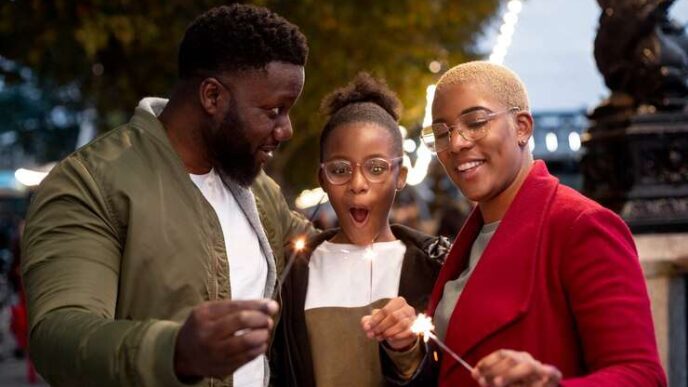As February 14th approaches, African parents worldwide find themselves asking: Should our kids join the Valentine’s Day frenzy?
Valentine’s Day has evolved from a religious observance to a global celebration of love. For African families in the diaspora, the decision to let children participate isn’t always straightforward.
Is it an innocent celebration of kindness, or does it dilute cultural values? To decide, we need to unpack its history, its impact on young minds, and how it aligns (or clashes) with African traditions.

The Origins of Valentine’s Day
Forget roses and chocolates—Valentine’s Day has a darker past. It originated from Lupercalia, an ancient Roman festival where men whipped women with goat hides to ensure fertility.
The holiday later morphed into a tribute to St. Valentine, a priest executed for secretly marrying couples. By the 14th century, Geoffrey Chaucer romanticized it in poetry, and by 1913, Hallmark transformed it into a commercial behemoth.
For African diaspora families, this history is a mixed bag. Many of our love traditions—like the Yoruba Eyo Festival or Ethiopia’s Fichee-Chambalaalla—center on community bonds rather than grand romantic gestures. Yet, ignoring Valentine’s Day isn’t an option when it dominates schools, stores, and screens.
Navigating the ‘Love Economy’
Step into a Target in Houston’s “Little Lagos” or a Tesco in East London, and you’ll find aisles packed with Valentine’s plush toys, glittery cards, and overpriced chocolates.
Kids in diaspora communities can’t escape it—schools organize card exchanges, TV shows promote Valentine’s specials, and even YouTube pushes “perfect gift ideas.”
African parenting is deeply rooted in Ubuntu (“I am because we are”) and Ghana’s Ayekoo (celebrating collective effort). Valentine’s Day, with its emphasis on individual affection, can feel at odds with these values.
While some parents see it as an opportunity to teach kindness, others worry that it fosters exclusivity—favoring the kids who receive the most cards or gifts.
Kids Can—Since It’s a Day of Love
Despite the concerns, Valentine’s Day can be a teachable moment rather than a commercial trap. Instead of rejecting it outright, parents can shape the experience to align with African values.
Here’s how:
- Celebrate love in all forms: Instead of just romantic love, encourage kids to appreciate family, friends, and teachers—mirroring Africa’s extended family culture.
- Make it inclusive: Swap “Will you be my Valentine?” with “You are appreciated” cards, ensuring no child feels left out.
- Infuse African traditions: A school in Toronto’s Little Ethiopia lets students make cards with Amharic proverbs on love, reinforcing cultural pride.
By redefining the holiday, kids can participate without losing their roots.

The Valentine’s Day Dilemma: Culture vs. Consumerism
Let’s be real: Valentine’s Day isn’t just about love—it’s a business. Last year, $2.6 billion was spent on only flowers, which was 39% of all Valentine’s Day purchases. For African parents already balancing remittances, school fees, and community obligations, this can feel unnecessary.
Some kids also experience exclusion if they can’t afford to participate. A study by YouGov.com found that nearly half of US adults believe Valentine’s Day is too commercialized.
Meanwhile, in Nairobi or Dakar, the holiday is often seen as a Western import that overshadows local traditions like Senegal’s Taasu (poetic debates) or Zimbabwe’s Roora (bride price ceremonies).
Parents must ask: Is this a holiday we embrace—or one we redefine?
A Balanced Approach: Love, Tradition, and Jollof-Flavored Chocolates
Rather than rejecting Valentine’s Day outright, families can tailor it to fit their values:
- Blend cultural elements: Instead of generic candy hearts, make heart-shaped chin chin or Valentine’s cards with Nigerian adire prints.
- Prioritize community love: Organize a “Love Your Neighbor” day where kids make appreciation cards for elders—just like Ghanaian respect for the elderly traditions.
- Reject excess consumerism: Swap store-bought gifts for handmade crafts, storytelling, or kola nut-sharing ceremonies.
Even schools can adapt. A London primary school hosted a Global Love Day, where kids shared traditions from their heritage—Tanzanian ujamaa (familyhood) songs, Caribbean folktales, and Nigerian proverbs. The result? A celebration of love without cultural erasure.
Conclusion: Love Without Borders
Valentine’s Day isn’t inherently good or bad—it’s what we make it. For African diaspora families, the key is balance: letting kids enjoy the celebration while reinforcing their heritage.
So go ahead—let your kids celebrate. Just make sure it comes with a dash of African flavor.















